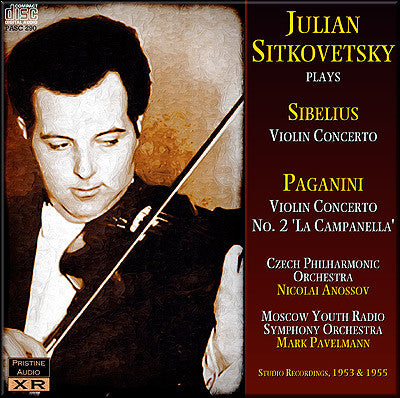
This album is included in the following sets:
This set contains the following albums:
- Producer's Note
- Full Track Listing
- Cover Art
Two superb concerto recordings from tragic Russian virtuoso
"The greatest violinist I have ever heard" - Yehudi Menuhin
The Sibelius concerto recording by Julian Sitkovetsky came to me in a collection of discs transferred for Pristine Classical's streaming audio service by Dr. John Duffy, accompanied by another recording made by Anossov with the Czech Philharmonic. The name Sitkovetsky rang a bell - a few years ago we briefly issued a recent live recording made locally by his son, Dmitry Sitkovetsky, also a world-renowned violinist - and when I heard the performance here I determined to find out more.
Alas Julian Sitkovetsky's recordings are understandably few, and some of what have survived are of poor technical quality. Happily the two concerto recordings presented here were both of sufficient quality to make a full 32-bit XR remastering not only beneficial but highly worthwhile. Despite some surface noise at times on Dr. Duffy's Supraphon sides, much of which I've been able to alleviate, and some rather rough tone at times from the Moscow Youth Radio Symphony Orchestra, Sitkovetsky's playing shines throughout these recordings, and is a consistent joy to hear.
Andrew Rose
-
SIBELIUS Violin Concerto in D minor Op. 47
Rec. 1953, Prague
Czech Philharmonic Orchestra
conductor Nikolai Anosov
-
PAGANINI Violin Concerto No. 2 in B minor Op. 7
Rec. 1955, Moscow
Moscow Youth Radio Symphony Orchestra
conductor Mark Pavelman
Julian Sitkovetsky violin
Sibelius transfer and original restoration work by Dr. John Duffy
XR remastering by Andrew Rose at Pristine Audio, May 2011
Cover artwork based on a photograph of Julian Sitkovetsky
Total duration: 58:34
MusicWeb International Review
One of the violinists for whom phrases like "jaw-dropping" were invented
Yulian Sitkovetsky was one of the violinists for whom phrases
like "jaw-dropping" were invented. His status as a near legendary
figure was compounded by a tragically early death at the age
of thirty-three - his nearest American parallel in that respect
was Michael Rabin, his nearest European, Ossy Renardy - and
also by the rarity of his discs in the West. Two labels have
worked hard on his behalf, Aulos and Artek. But now we have
a single contribution from Pristine Audio which conjoins one
of his more problematic concerto performances, the Sibelius,
with a brilliant but scrappily recorded Paganini concerto.
For the Sibelius. he was joined in Prague by the Czech Philharmonic
under Nicolai Anosov (the father of Gennadi Rozhdestvensky),
a splendid conductor I’ve had reason to praise in review
here for his high class Liszt accompaniments for Ginzburg in
Moscow. Here we are again - he’s splendid. We hear the
soloist’s very fast vibrato, especially in the upper two
strings, and that characteristic nutty sound in the middle of
his register. It’s a feature of his playing that the lower
strings don’t sound as quickly and seem rather less responsive.
Despite the recession of the live concert acoustic the orchestra
is well marshalled and any brass blare is probably an acoustic
matter. Try to listen out for those Dvořákian winds
- no other word will do - in the first movement and also to
the dazzlingly well-played left hand work in the cadenza. Brass
statements are big and bold, the performance pretty speedy and
very exciting - in truth a little too much so. Despite the fact
that he has always been compared with Kogan Sitkovetsky was
by now very much his own player. One or two moments at the climax
of the first movement suggest a Heifetz influence, and indeed
he takes a Heifetz kind of tempo throughout. Another characteristic
of the performance is that he often attacks from slightly under
the note and this compromised intonation recurs though it’s
not overly problematic if you listen through it. It’s
a young man’s performance from the teaky middle voicings
to the fast upper ones, and he imparts tremendous varieties
of colour and characterisation in the second movement - it becomes
a kaleidoscopic character study in his hands in effect. This
narrative gift serves him well - the fervour is unceasing and
the graph of the movement is charted with feverish intensity.
Certainly some tone production in the finale can be a touch
glassy but he slashes into the harmonics and drives to the final
bars with panache. It’s certainly not one for patrician
Sibelians or those who admire Anja Ignatius’s wartime
recording but the world can encompass a wide range of readings
and this is certainly one of those.
The Paganini was taped two years later in Moscow with an orchestra
here named as the Moscow Youth Radio Symphony Orchestra, though
in previous releases it was always ascribed, I believe, to the
USSR State Radio Symphony Orchestra. Of one thing we’re
sure; the conductor was Mark Pavermann. Sitkovetsky is brilliant
in this work, though occasionally, a feeling exacerbated by
the recording quality, inclined to be brusque, even rough. But
he is technician of exceptional panache, a lordly exponent,
held in spotlight due to the very upfront perspective. There
is fire in his harmonics, and real devilment in the Campanella
finale.
Aulos’s transfer of the Sibelius [Aulos Music AMC2-054]
was taken direct from the master tapes, it appears. Artek’s
transfer of the Paganini - volume 4 in their Sitkovetsky series
- was not so fortunate [AR 0030-2]. Pristine Audio has gone
for the Big Bertha approach, as always. This makes the dynamics
in the Paganini very much more visceral and indeed dramatic
than the LP - and the CD on Artek - which was a lot flatter.
Graph work has bulked it up. It’s also imparted a touch
more glass to the sound than the Artek. It’s horses for
courses, I suppose, but in the main work, the Sibelius, I strongly
prefer the Aulos.
Jonathan Woolf

